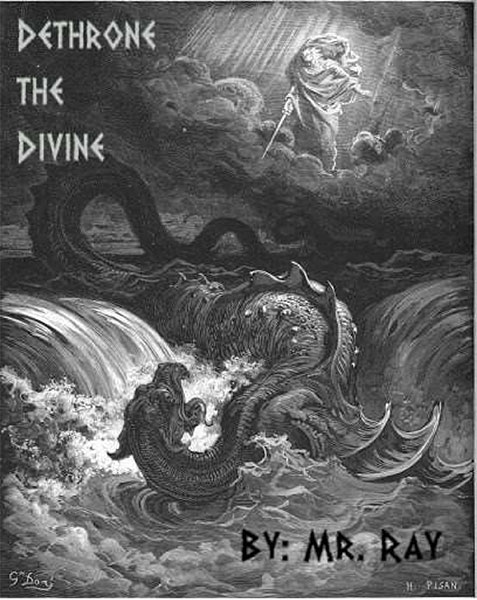Dethrone the Divine is a role playing game written and published by Mr. Ray and is covered by the Creative Commons Attribution-ShareAlike 4.0 License.
The supplement is available as a 23-page PDF from itch.io but was purchased at a reduced price as part of a special bundle. One page is the front cover and one the front matter. A second, one-page PDF is a character sheet.
 The first page of content, in a hard to read font, explains that gods have had to rebrand themselves to deal with the changing world and technology, but there are some godlings who want to rise and dethrone the existing gods.
The first page of content, in a hard to read font, explains that gods have had to rebrand themselves to deal with the changing world and technology, but there are some godlings who want to rise and dethrone the existing gods.
How to Play explains that this uses a simple system intended to be played by 3-6 players, one being a GM, that there are five main attributes and that resolutions are settled by dice pools. Dice pools are made up of d6s and rolls of 5 or 6 are successes. Whoever rolls the most successes gets to narrate the results of an action, and a tie between GM and player means a compromise must be made.
Dice pools are based on the relevant attribute and applicable modifiers, including Hindrances, which reduce the dice pool, as does armour and magic. A sidebar gives some examples. One dice is the Divine Dice and 4-6 is considered a success on that as well as possibly granting a Boost, if the plater rolls a success on it and wins the Resolution Roll, or a slip, where they got a success on the Divine Dice but lost the Resolution Roll, allowing them to narrate an opportunity. The Divine Dice can be used to push outside a character’s domain and two or more characters can help each other on a roll.
Failing a roll grants an experience check, and six of these grant a level up, allowing them to add a point to an attribute, add another special trait, grant an additional domain or gain an acolyte.
Character Creation explains that a name and concept are important to the character. 16 points are divided amongst the five attributes. Might is about those things that can be handled by force and melee. Grace is skilled control of the body and ranged. Skill is for generalised tasks that require specialised knowledge. Aura is used for persuasion, inspiration, seduction and intimidation. Spirit is magic.
Traits help define the character and characteristics; they have a quality, a background, a relationship with another character and a special trait. Domains are what the character or concept works best with. Origins is a list of potential origins for the godling, covering a range of options. Each has a description and a Perk.
Health is determined by Might and Grace and is one component of a character’s wellbeing. Resolve is Skill and Aura. Following are the people who believe in the deity, and the higher the rank, from one to five, the more people follow them and the more power they gain. Fear is how exposed the divine is. Gear is equipment. Next there is a variety of sample build ideas.
Conflict and Recover explains how all Conflicts, including combat, are handled, and how characters recover.
Being the Guide of the Game is a brief part on GMing.
Opponents and Challenges has some sample opponents who have Challenge Ratings, which they take damage from.
Crafting a Campaign has some details on how to do this.
The final page of content is a character sheet.
Dethrone the Divine in Review
The PDF lacks bookmarks and, though it is comparatively short, could have used them. Navigation could be better. The text maintains a two-column format and appeared to be free of errors. Bar the cover, there are no illustrations. Presentation is adequate.
This is a fairly rules-lite game with a narrative element. It should be easy enough to learn and play. The idea of the characters being godlings isn’t new, but it isn’t that common either. The game is, though, at full price incredibly expensive. Dethrone the Divine can be found by clicking here.

Leave a Reply